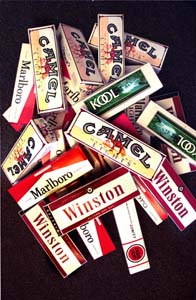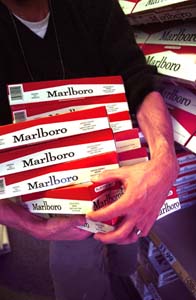![[Metroactive News&Issues]](/gifs/news468.gif)
[ San Jose | Metroactive Central | Archives ]
 Up in Smoke: More profitable than growing marijuana and safer than dealing illegal drugs, cigarette smuggling is taking over as the pop crime of California's high-taxed times.
Up in Smoke: More profitable than growing marijuana and safer than dealing illegal drugs, cigarette smuggling is taking over as the pop crime of California's high-taxed times.
Photograph by George Sakkestad
Smoke Screen High taxes and worldwide demand bring high times for contraband cigarette dealers By Mary Spicuzza LAST MONTH, robbers blasted into a downtown San Jose warehouse, pistol-whipping the owner and filling their midsize U-Haul van with about $100,000 worth of stolen "drugs." The South Bay heist occurred only one month after a bust in North Carolina, where the Federal Bureau of Investigation hauled in 17 smugglers running the same contraband goods. The group faces charges of trafficking drugs to fund gunrunning for Hezbollah, an Islamic militant group backed by the Shiite Muslim community. And in the Italian port town of Brindisi, smugglers cornered by police slammed a battering ram, which was attached to the front of their bulletproofed SUV, into the officers' car. The suspects escaped on foot but left their cargo behind, the same drugs stolen in San Jose and buying rifles on the East Coast. They weren't running cocaine or heroin, but smugglers' current drug of choice--contraband cigarettes. On the international black market, cigarette smugglers are proving that guns, violence and international terrorism aren't just for illegal drug dealers anymore. Some say it's due to high taxes, other say Big Tobacco companies collaborating with dealers are to blame. But from China to Columbia, California to Canada, everybody seems to agree that the burgeoning cigarette black market has become far more lucrative than selling marijuana, and safer than running illegal drugs--except for law enforcement, which has seen levels of violence rise with the profits at stake. The SUV-driving smugglers in Italy, for example, were willing to kill for 20 cartons of smokes. Nic Fit THE SAN JOSE THEFT at the wholesaler's warehouse may have been the biggest in a string of South Bay cigarette robberies, but it wasn't the most violent. Four thieves who held up a 7-Eleven on Cropley Avenue near Milpitas kicked and beat the clerk, who wound up in the hospital with a broken arm and fractured jaw. Like the Italian dealers, they only made off with about 20 cartons of cigarettes. "At this time we don't think any of the local thefts are connected," says San Jose Police Department Detective Patrick Boyd. "The price of cigarettes has gotten real high, meaning the value of cigarettes is going up on the black market." While the department's public information officer, Rubens Dalaison, agrees that costly cigarettes have become a profitable commodity, especially since the recent passage of cig-tax boosting Proposition 10, he says that stealing smokes is nothing new. "Our vice unit has been going out for years to advise shop owners on risk awareness," Dalaison says. "Now, just the amount and quantity have increased." Police have only arrested one person for a rash of thefts, and a 16-year-old suspect was released without providing officers leads on other similar incidents. Officers remain uncertain whether the crimes are organized crime or gang-related, and because the cases are still under investigation, they can't answer questions about where cigarettes may have been smuggled, or to whom. Unanswered questions around cigarette smuggling seem to be a chronic condition throughout California. Los Angeles Police Department Detective Jack Giroud refuses to talk about local cigarette thefts, which have involved truck hijackings and a high-speed chase through the San Fernando Valley. "I don't want to discuss it," says a frustrated Giroud. "We don't have anybody in custody, and I don't want to teach people how to steal cigarettes."
Photograph by George Sakkestad
State of the Sticks 'WE REGULATE everything that's interesting and controversial," chirps Marti McKee, public information officer for the San Francisco branch of the Alcohol, Tobacco and Firearms Bureau (ATF). And things have never been more exciting in the world of cigarette investigators. During the flurry of lawsuits against Big Tobacco companies like British American Tobacco and R.J. Reynolds, thousands of pages of corporate documents indicated that cigarette manufacturers may have played a role in global smuggling operations. Tobacco companies, who lobbied hard against cigarette taxes like California's Proposition 10, have maintained that they shouldn't be held accountable for what happens to their product after it's sold. Libertarians agree, blaming high taxes for the burgeoning black market and new government enforcement bureaucracy. "Californians need to do away with this draconian, discriminatory and unfair tax," Libertarian Party state chair Mark Hinkle wrote in support of this spring's attempt to repeal the 1998 tobacco taxes brought by Proposition 10. According to Leslie Thompson, a former employee of RJR Nabisco, his bosses knew of and encouraged global smuggling operations. This summer he told Newsweek (July 31, 2000) that his export outfit owned by RJR Nabisco actually worked with smugglers to import cigarettes, which were then stored secretly on a Mohawk reservation on the U.S.-Canadian border before being sold to Canadian black marketeers. Thompson's road map may have been a new one, but it came as no surprise to investigators at the World Health Organization. They estimate that one-third of the 200 billion cigarettes exported in 1998 ended up in smugglers' warehouses. Alcohol, tobacco and firearms specialist McKee says that she can't divulge too much information about the organized crime syndicates suspected in California cigarette thefts, except that they seem to exist. "These are the same types of organized criminal networks involved in illegal drugs," McKee says. "The taxes are relatively new, but ATF has been extremely involved because of some big cases. In California this has been a newer thing because of the recent tax." Smoke Signals/Bootleg Butts IN SAN JOSE, cigarette thefts used to involve grabbing a few packs, or maybe a carton, and slipping out of a 7-Eleven or local tobacco shop. But as profits increase, so does the use of U-Haul trucks, firearms and violence. California tax collectors haven't yet calculated how much tax money the state government has lost to smugglers. But David Schiller, an assistant U.S. attorney in Virginia, says that one smuggling ring alone is believed to have cost the state $18 million in tobacco and sales taxes. Monte Williams, chief of the investigations division for tax collectors at Sacramento's Board of Equalization, says they hope new laws passed in 1999 to regulate imports and exports will squelch smuggling rings. The laws require stricter regulations meant to prohibit products sold for use outside the United States from being brought back into the country, where they can then be sold at discount on the "gray market," free of state tobacco taxes. On the web, about 2,000 sites offer discounted cigarettes. For example, the web-based smokeshop www.dirtcheapcig.com advertises itself as "the last refuge of the persecuted smoker." But because many such websites have their stocked warehouses on Native American lands, which are free of national tobacco tax requirements, tax collectors find that law enforcement needs to become as sophisticated as cigarette smugglers. "It has made life more interesting," Williams says of the World Wide Web. Still, few smokers seem too concerned about cigarette companies--or the government--losing money due to competition from bootleggers. "If somebody came to my house selling cigarettes, I'd buy them," Morgan Pershing, a Mountain View-based dotcom employee and longtime smoker, says. "It's not like the cigarette companies are angels or anything." [ San Jose | Metroactive Central | Archives ]
|
From the November 16-22, 2000 issue of Metro, Silicon Valley's Weekly Newspaper.
Copyright © 2000 Metro Publishing Inc. Metroactive is affiliated with the Boulevards Network.
For more information about the San Jose/Silicon Valley area, visit sanjose.com.
 Marlboro Men: Costly cigarettes bring in enough profit to win favor even among organized crime circuits. Members of Hezbollah reportedly sold enough smuggled smokes to buy loads of weaponry for their militant Islamic group, according to the FBI.
Marlboro Men: Costly cigarettes bring in enough profit to win favor even among organized crime circuits. Members of Hezbollah reportedly sold enough smuggled smokes to buy loads of weaponry for their militant Islamic group, according to the FBI.